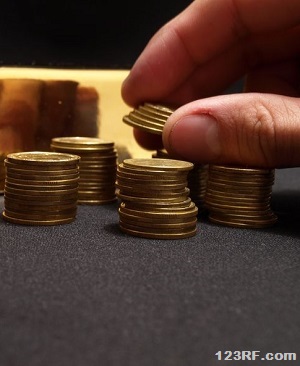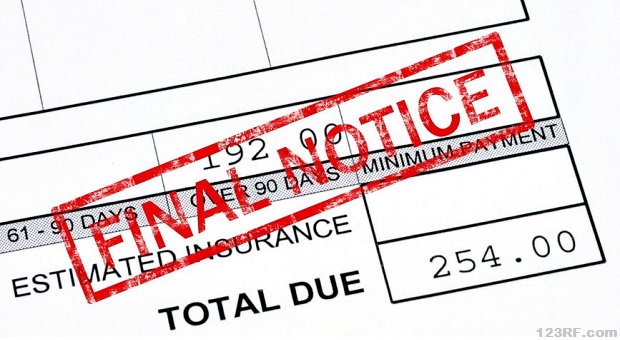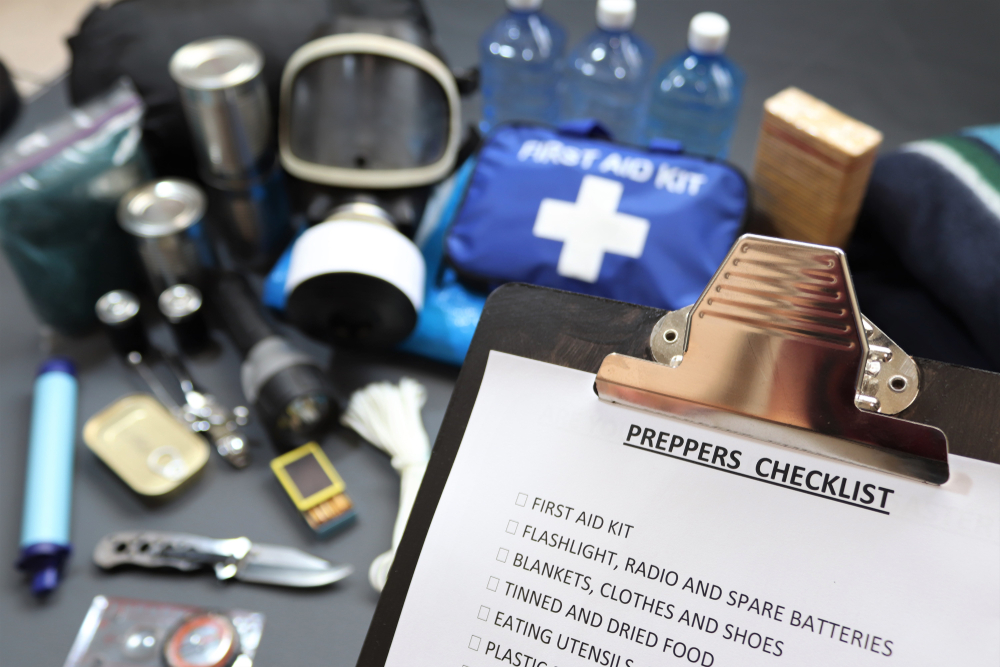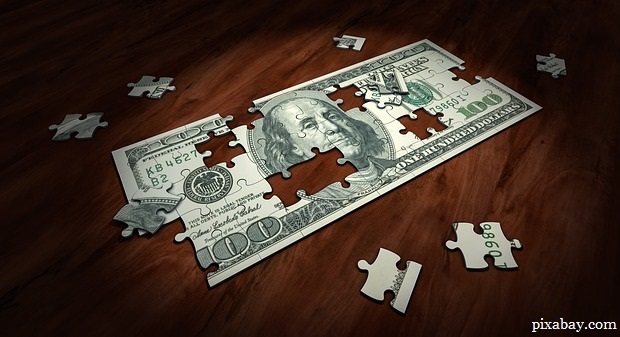A number of years ago I heard a credit card ad from Citibank that was scary. The ad ended with them saying something like, “We know 1 out of four families in America, what about yours?”
Do you see any significance in that statement, or was it just me? What I saw was that at that time, 25 percent of our population owed one bank money. Like I said… scary.
I’d be willing to bet that today the figure is much higher.
America has become a nation of debtors, with the average family living on 110% of what they earn. Every year our personal debt increases, with no end and no paying it off. At the rate we are going, we will all die in debt; passing debt, rather than an inheritance on to our children.
I guess it’s not all that surprising that the national debt keeps growing, considering that personal debt does as well. However, you and I can’t just print money to make up for our shortfall, like the government does. Eventually we have to pay that money off, one way or another.
This is an area where few preppers think to walk. I don’t have any statistics, but based upon what I see, many preppers have just as much outstanding debt as anyone else; debt that will follow them into whatever crisis might present itself. Paying that debt off in the middle of a long-term crisis would be difficult, especially if that crisis was a financial collapse.
Steps to Take
The best thing we can do with debt is to get out of it. While that might not be easy, it can be done if we are willing to take the necessary action.
Cut some corners on your budget and use that money to pay off your loans. Sell your new cars and drive something a little bit older. Tackle your debts one at a time and pay them off; starting with the smaller ones. Then, once one is paid off, apply the money for those payments to the next biggest debt, paying it off early.
When a crisis comes, you may not have the income you need to pay all those debts; that’s the danger that you face. If you can’t pay, there’s a very good chance that you’ll end up losing whatever it is that you owe the money on. While there are some actions which you can take to forestall that, none of them are as certain and secure as not having the debt in the first place.
So, let’s say a major crisis happens, even a financial collapse. What can you do with those debts?
First of all, you can try and get the lender to accept what is known as a forbearance. This is a legal contract where they agree not to take any action on you for a pre-determined amount of time or until you are working once again.
Forbearance is most commonly used by graduating college students to put off paying their student loans until they get a job, but that’s not the only place it is applicable.
The next thing you might want to try is loan consolidation. Typically, in a loan consolidation situation a new loan is taken out, which is used to pay off the old ones. This new loan usually has a lower interest rate and lower payments. If you have a lot of credit card debt, you may want to consider doing this now.
If you have a financial windfall, you could have the answer to your debts right there. Most people look at a financial windfall as a means of buying something they’ve always wanted. While there is nothing wrong with that, doing so when you have outstanding debt is not good financial management. Better to use that money to get out of debt, and then start saving up to buy that thing for cash.
If that financial windfall isn’t big enough to pay off your debt, it still might become the seed to allow you to pay it off. Any serious financial crisis is going to bring high inflation with it, maybe even hyperinflation. Whenever that happens, it creates a great investment opportunity.
The Power of Example
Let’s say that you get $10,000 from your Great Uncle Joe’s estate. That probably won’t be enough to get you out of debt. But you can take that money and buy gold and/or silver with it. The reason I’m suggesting that is that in any financial crash or time of high inflation, gold and silver rise in value.

If you were to try this, you’d want to make sure that you were one of the first people to cash in your gold and pay off your debt.
If things get bad enough, banks will be pressuring the government to allow them to renegotiate loans (which really means that they decide the new interest rate and tell you; there’s no negotiating). You need to beat them to that, paying off your loan before they can make that move.
If all else fails, you may need to default on some of your debts. While I really don’t recommend this, there may come a time where you don’t have any other choice. In that case, you’ll want to think through which debts you can most afford to default on. That decision has to be made on what you need to keep in order to survive.
Let’s take a typical family’s debts for example. They probably owe money on their home mortgage, two cars, some credit cards and a purchase or two; say some furniture and a big-screen TV. The easiest debt to default on is the credit cards, even though they could make minimal payments on them.
Unless they have a bug-out cabin in the woods, they need their home to survive. That’s got to be number one. They can probably get by just fine without the furniture and TV, so that’s not a priority. So, the first ones to let go are the credit cards and the “extra” payments. The next one would be one of the cars. Car payments are expensive and in a survival situation, you probably only need one of them.
While this may still leave the family in a financial pinch, taking these sorts of actions could at least forestall the situation, allowing you to come up with an alternate plan, such as trading your car for an older one and downsizing your home.
Drastic times often require drastic actions.
This article has been written by Bill White for Survivopedia.









David | August 26, 2014
|
1 in 4 is 25 %, not 20%
Rapt5or555 | August 26, 2014
|
A word of advice on how not to get into debt in the first place. Finance things that appreciate if you don’t have the cash to buy it but be sure you can pay the monthly payments. NEVER finance items that depreciate because now you’re paying interest on the loan AND losing money on the value of the item; a double whammy. Save the money to buy it and pay cash for it. Also, remember that there is a big difference between ‘want’ and ‘need.’ I WANT a new car but I already have one that works fine so I don’t NEED one. Spend your money for the things you need before buying the things you want and pay cash when you do. Final advice: Adjust your tax exemptions so that you don’t get a refund at the end. Why allow the government to keep your money throughout the year and refund it to you without interest? That is money you may need during he year and could probably keep you from having to finance something. It is better to put that money into a savings account for emergencies should they arise.
cactusbob | August 26, 2014
|
This is a good common sense article, eerily like the advice received on the Suze Orman Show.
One thing that Suze stresses is the need to accumulate a cash reserve, ideally at least large enough to cover 8 months of living expenses. You think you can’t do that? Start small but be consistent. Pay yourself first on every payday, as the adage goes, and soon your savings will add up to a lot. Compounding doesn’t amount to much at a savings rate of 0.1%, but regular accumulating does! By changing your attitude about your spending, anyone can succeed in reducing your spending and increasing your savings. Being realistic about needs vs. wants is the secret.
Osito | August 26, 2014
|
I applaud Mr. White for tackling the subject of debt in a blog on survival. Yes, the likelihood of a survival situation being a sustained event occurring slowly enough to make debt repayment a serious problem is great. Unfortunately, the subject is difficult to cover in 500 words or so.
Mr. White uses the currently faddish rule of thumb of paying off the smallest debt first. This is a purely psychological ploy; the thought being that the small wins will make you more willing to accept the sacrifices necessary to take on the next bigger debt, repeating to create a snowballing effect. Personally, I would prioritize the debt.
I don’t know your circumstances, but where I live, I could no longer find a good used vehicle that both met my needs and made economic sense. I bought a new vehicle (using my high-dollar used car for trade-in) for nearly 0% interest and lowered my insurance by $30/mo. There is no substitute for “penciling things out”.
I bought my acreage, utility systems and outbuidings outright. My house is on an unsecured loan. If I can’t make the payment, then the house can be repossessed, and I can convert one outbuilding into an emergency home.
I own some gold and silver, but the example is for a hyper-inflationary currency collapse. While this is a more common scenario throughout history, it is unlikely at this time. Today looks more like 1929. The world fell into a deflationary depression. Gold and silver were useful, but land for subsistence farming was better in some ways. Some of both was best or the family of average means.
Good luck, and manage that debt now!
C. T. Kraus | August 26, 2014
|
What if the dollar is devalued to near nothing but you have enough to pay your mortgage each month or enough money in a bank to pay off the debt? Will lenders accept this in a crisis?
Great Grey | August 27, 2014
|
Unless there is a clause allowing changes in the payment amount, legally they have to.
Rapt5or555 | August 27, 2014
|
HUH? Your question makes no sense.
Bill | August 26, 2014
|
I have see the following in my family, so I know this one is true. The husband was making six figures before the housing meltdown in finance. They saved a nice nest egg. The wife used it to pay off most debt, but could not pay out the house or cars. The housing bubble burst, he lost the income, and they had nothing to fall back on. Moralnof the story is, ALWAYS stay liquid. Have enough to make ends meet for what ever time you think it will take you to get back on your feet. Be it gold, silver, or paper. But do not pay off debt at the expense of your liquidity.
Pingback:Negotiating Your Way to Debt Relief | Survival skills, survival guns, survival guide | September 18, 2014
|
Pingback:Former Debt Collector Reveals 4 Legit Inside-Tips To Achieve Debt Relief | PatriotsBillboard | September 18, 2014
|
Pingback:Negotiating Your Way to Debt Relief | The Prepper Dome | September 19, 2014
|
christi | September 27, 2014
|
Good advice, doesn’t work so well when you’re out of work for most of the year. The job market is none existent where i’m at, most of the time. It’s a catch 22, can’t move with out money, can’t sell the house to be able to move because of no jobs.
Pingback:Top 4 Things to do Prior to the Dollar Collapsing | Survival skills, survival guns, survival guide | October 15, 2014
|
Pingback:Bugging in Place and Making Your Stand | Survival skills, survival guns, survival guide | November 20, 2014
|
Pingback:Bugging in Place and Making Your Stand | The Prepper Dome | November 20, 2014
|